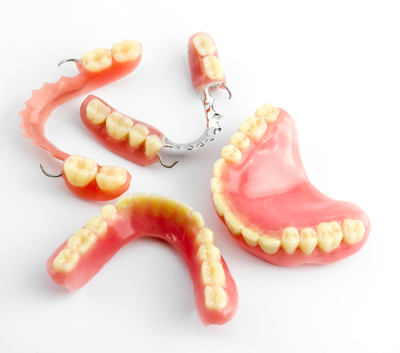Comprehensive dental care by a team of board certified and expertly trained specialists in every aspect of dentistry.

Dentures, also known as “false teeth,” are removable replacements for missing teeth and surrounding tissues. There are two types of dentures: Complete and Partial dentures. Complete dentures are used when all the teeth are missing. Partial dentures are used when some natural teeth remain in the upper or lower jaw. A removable partial denture usually consists of replacement teeth attached to a pink or gum-colored plastic base that is connected by a metal framework that holds the denture in place in the mouth. A more cosmetic metal-free partial called a Valplast partial can also be made. Not only does a partial denture fill in the spaces created by missing teeth, it prevents other teeth from changing position.
The denture development process takes anywhere from three to six weeks and requires several appointments. Once you and your dentist decide what type of appliance is best for you the general steps are as follows:
The denture development process takes anywhere from three to six weeks and requires several appointments. Once you and your dentist decide what type of appliance is best for you the general steps are as follows:
- Making a series of impressions of your jaw and take measurements of how your jaws relate to one another and how much space there is between them.
- Creating models, wax forms, and/or plastic patterns in the exact shape and position of the denture to be made. You will “try on” this model several times and the denture will be assessed for color, shape, and fit before the final denture is cast.
- Casting the final denture
- Making any necessary adjustments to ensure a perfect fit
Adjusting to new dentures.
New dentures may feel a little odd or loose for a few weeks until the muscles of the cheeks and tongue learn to adjust to them and you get comfortable inserting and removing them. Also, it is not uncommon to experience some minor irritation or soreness, at first, as well as an increase in saliva flow when you first start wearing new dentures. This is perfectly normal and should be no cause for concern.
Also, you may have a bit of difficulty pronouncing certain words at first, but it just takes some time and practice to get accustomed to speaking properly with new dentures. If you notice them “clicking” while you’re talking, they may need some adjustment and you should contact the dentist.
Once your mouth adjusts, wearing dentures becomes like second nature. Eating with them may take a little practice, however. It’s best to start with soft foods cut into small pieces, and to chew slowly using both sides of the mouth. Add other foods as you get used to eating with your new dentures, but you will want to avoid extremely sticky or hard foods at first—as well as avoid chewing gum. Also, it’s advisable not to use toothpicks when you’re wearing dentures.
Since they’re made to closely resemble natural teeth, dentures should not result in any change in your overall appearance. However, you may actually notice an improvement in your smile and the overall contour of your face once you get comfortable wearing them.
How long should you wear your dentures each day?
Your Crystal dentist will give you instructions on how long to wear your dentures and when to remove them. During the first several days, you may be instructed to wear them all the time—even when you sleep. This is the quickest way to identify the areas on the denture that may need adjusting. Once the adjustments are made, you should remove your dentures before going to bed. This gives your gum tissues a chance to rest and allows for normal stimulation and cleansing of the tongue and saliva. When you wake up in the morning, you can put the dentures back in your mouth.
Some denture wearers use denture adhesives, particularly those individuals with dry mouth conditions (including those taking cold medications, or those who may have neurological disabilities) that may prevent the dentures from adhering properly. In addition, those denture wearers who place unusual demands on their facial muscles—musicians or individuals who do a lot of public speaking, for example—may also find that using a dental adhesive gives them added stability and security.
Are there alternatives to wearing dentures?
In some cases, dental implants can be used in place of dentures. Your dentist at Crystal Dental will be happy to advise if that’s a better alternative for you.
Crystal Dental is located in downtown Los Angeles. If you’re looking for affordable dentures and implants services near you, our experienced dentists are ready to help.
Call our office at 213.748.8448 or contact us here to set up a Free dental consultation!